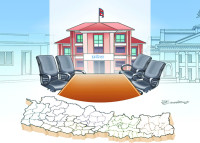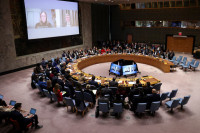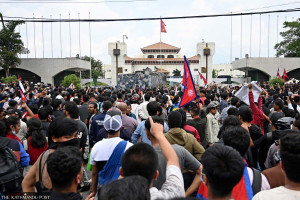Opinion
One more chance
The major parties should use the next seven days to address the demands of the Madhes-based parties and the Tharus
The killing of eight policemen including a high-ranking official in Kailali cannot be pardoned under any pretext. The Kailali carnage was not a political issue and therefore, the perpetrators should not go unpunished arguing that it was an expression of anger of the Tharu population. At the same time, as the Tharu movement in Kailali and other parts of the country is a political one, the four parties—Nepali Congress (NC), CPN-UML, UCPN (Maoist) and Madhesi Janadhikar Forum-Loktantrik (MJF-L)—should find a political solution to address their grievances.
The parties, however, only have a limited period of time to address the demands of the Madhesis, Tharus, Dalits and Janajatis. With the endorsement of the modified draft of the constitution on Sunday, the Constituent Assembly (CA) members only have seven days to register their complaints on the constitution bill. In case the parties fail to reach a consensus within the time-frame, there will no longer be any room for further amendment. Even so, if the four parties and agitating parties/groups are serious about resolving the current crisis, one week is more than enough. Reaching an agreement with the Madhes-based parties and Tharu community is crucial as it will ensure greater ownership of the new constitution which is a precondition for the long-term stability of the country.
If the parties reach an agreement, the CA members, on the behalf of all the parties, can register an amendment proposal and it will become part of the constitution. The CA could also consider an additional window period if the dialogue between the four parties and the protestors takes a positive turn.
Focus on the plains
The problem started on June 8, when the four major parties agreed on promulgating the constitution by mentioning that Nepal will be divided into eight-provinces leaving their demarcation to the federal commission. They later proposed a six-province model with demarcation. This decision resulted in violent protests in the Mid-West, Karnali and in the Madhes. The parties then revised the demarcation and proposed a seven-province model. However, this move only addressed the demands of the Mid-West and Karnali, not that of the Madhesis and the Tharus. By then, it became clear to all that the top leaders’ decision to delineate the states was not based on any principle but rather done with an objective to secure their constituencies. The parties did not provide any reason on why some districts were split while the districts, constituencies of the top leaders of the major parties remained undivided.
Join the talks
Of late, the NC, UML and Maoist leaders are saying the proposed federal commission will settle the issue of demarcation. But, they should instead be open to reviewing the current seven-province model. As some Madhes-based parties have already abandoned the agenda of ‘EkMadhes, Ek Pradesh’ model, there is plenty of room for reaching an agreement. Nonetheless, the stance taken by some Madhes-based parties like the Terai Madhes Loktantrik Party, Sanghiya Samajbadi Forum led by Upendra Yadav and Sadbhawana party is not pragmatic. They continue to refuse to sit for talks.
The credit of firmly establishing the agenda of federalism and inclusion through the 2007 Madhes Movement no doubt goes to these parties. But they need to realise that it is now time to institutionalise those achievements. While the size of these parties might have been drastically reduced in the second CA, their role and responsibility in the constitution-drafting process is not a bit less. These parties seem to have forgotten their responsibility to promulgate the constitution as soon as possible to institutionalise the agendas of federalism, republicianism and inclusion.
Furthermore, these parties have only confined themselves to the issues related to the Madhes. Obviously, the agenda of the Madhes is important for regional parties. But leaders of national stature like Mahantha Thakur, Upendra Yadav and Rajendra Mahato must think about the country too. If the country plunges into crisis, the key achievements such as federalism, republicanism, secularism and inclusion will be in peril and under such circumstances, the Madhes-based parties will suffer the biggest loss. While there is absolutely no doubt that the Madhesi people have been discriminated against and marginalised, it is equally untrue to argue that the Madhes has not received anything after 2008 and that the new constitution will not address any of their demands. The Madhes-based parties have got their respective share in all the governments formed after 2008. Both the president and the vice-president also come from the Madhesi community.
Seven more days
The Madhes-based parties should, therefore, come to the negotiation table without any preconditions. If they do not have faith in the government, they can propose to hold talks with the sovereign CA. There is a special committee under the Political Dialogue and Consensus Committee which can hold talks with the Madhes-based parties. On part of the major parties, the Congress, UML, and the UCPN (Maoist) should hold serious negotiations with the Madhes-based parties to find a win-win solution. Top UML leaders, in particular, should treat them in a respectful way instead of humiliating them at the negotiation table as has frequently happened in the past. As these are the mainstream parties of the Madhes, they should be recognised accordingly, irrespective of their strength in the CA.
If NC and UML move ahead without addressing the demands of the Madhesis and the Tharus, Madhesi Janadhikar Forum-Loktantrik Chairperson Bijaya Kumar Gachhadar has already announced that his party will not be a part of the CA proceedings. Gachhadar is a signatory of the 16-point deal and had played a vital role in the past to push the statute drafting process. Other Madhes-based parties are already outside the CA proceedings, so if Gachhadar is forced to boycott the CA proceedings, it will be a hugesetback.
While signing the Comprehensive Peace Agreement in 2006, Madhes-based parties were not a part of it but after Madhes-movement they have always been part of the CA. So if Gacchadar quits the CA proceedings, it will send a message that the constitution was drafted without the participation of the Madhes-based parties. Therefore, the next seven days are going to be very crucial.
Both the Madhesi/Tharus on the one side and the three parties on the other should seize the moment. If no consensus is reached even within the next seven days, the CA process will move ahead and it could add to the ongoing unrest in the Madhes. This will neither do any good to the Madhes-based parties nor the big three parties.
Bhattarai is with the political desk at the Post




 6.84°C Kathmandu
6.84°C Kathmandu











